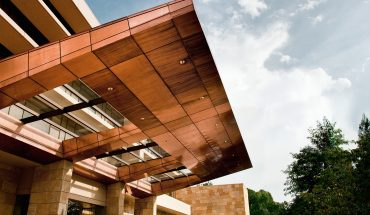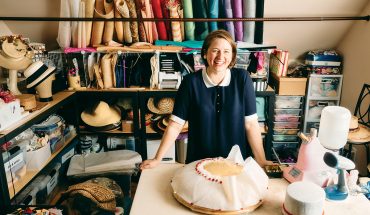
City view: The Dr. M.T. Pope house on South Wilmington Street in downtown Raleigh. Built in 1900, the house is on the National Register of Historic Places.
by Ilina Ewen
images from N&O archives and City of Raleigh Museum
The Pope House, a two-story brick home nestled on a narrow plot that was once in the center of Raleigh’s historic black Main Street, now stands alone, a stalwart reminder of an era passed.
After Reconstruction, this neighborhood was known as the Third Ward, a thriving African-American enclave. The neighborhood boasted residences of black professionals and business owners. Shaw University already stood nearby, as did several as churches and a small private hospital. The old brick structures that remain today provide a stark contrast to the steel of Raleigh’s growing skyline. This juxtaposition of old and new is epitomized at Stronachs Alley, between South Wilmington and South Blount Streets. Dr. Manassa Thomas Pope started building his home here in 1900, hugging the borders of a racially segregated Raleigh. Born free in 1858 as the son of literate landowners in Rich Square, North Carolina and educated at Shaw, Pope was a prominent citizen and one of North Carolina’s first licensed black physicians. Revered at a time when most blacks were persecuted, Pope set the stage to challenge voting laws by registering to vote in 1902. He then made a run for Raleigh mayor in 1919, becoming the only African American to run for mayor of a capital city in the South during the days of Jim Crow.
He also proved to be a savvy businessman, establishing the successful Queen City Drug Company in Charlotte. He served as an officer and surgeon in the Spanish-American War, and later practiced medicine in an office on Hargett Street and in an exam room he added to back of his house.
Pope’s home “is a national treasure and should be appreciated as such,” said Dr. John Hope Franklin, the esteemed author and historian who died in 2009. “The home’s treasures are a bounty of riches that tell our city’s history. There are myriad trappings of family life that show us what times were like for the affluent African-American class.”
Indeed, the Pope House is North Carolina’s only historic house museum of an African American family. Remarkably, only the Pope family has ever lived here.

Living museum: One of the most remarkable artifacts in the home is a wartime photo of Dr. Manassa T. Pope carrying his 1898 medical kit. That kit is still intact with its original contents and on display.
To visit the home is to step back in time. An upright piano, original tufted sofas, scraps of original wallpaper, wide plank hardwood floors, and everything from etiquette books to medical instruments to children’s storybooks, porcelain dolls, and lace dresses owned by Evelyn and Ruth, Dr. Pope’s daughters fill its rooms.
A petal-shaped stained glass window in the entry is a hallmark feature. The house also boasts original copper-plated hardware and hinges, intricately carved moldings, and newel posts and stair rails carved from a single block of wood. Original fixtures including gas and electricity hook-ups, running water, a full bathroom, telephone, and a servant call bell system all indicate the family’s wealth.
The home was placed on the National Register of Historic Places in 1999 and is now owned and managed by the City of Raleigh, which opened the home as a museum a year ago. Staff and volunteers are currently cataloging and archiving items in order to curate exhibits and outreach programs. The aim is for the home to be not only a house museum and a restored building, but a robust education center showcasing the roots, contributions, and cultural heritage of the people who once called the Third Ward home.
An exhibit of photographs from the family’s history at the City of Raleigh Museum runs Feb. 3-28.
The Pope House, at 511 S. Wilmington Street, offers free, guided tours on Saturdays, 10-3.
The City of Raleigh Museum: 220 Fayetteville St. cityofraleighmuseum.org.




